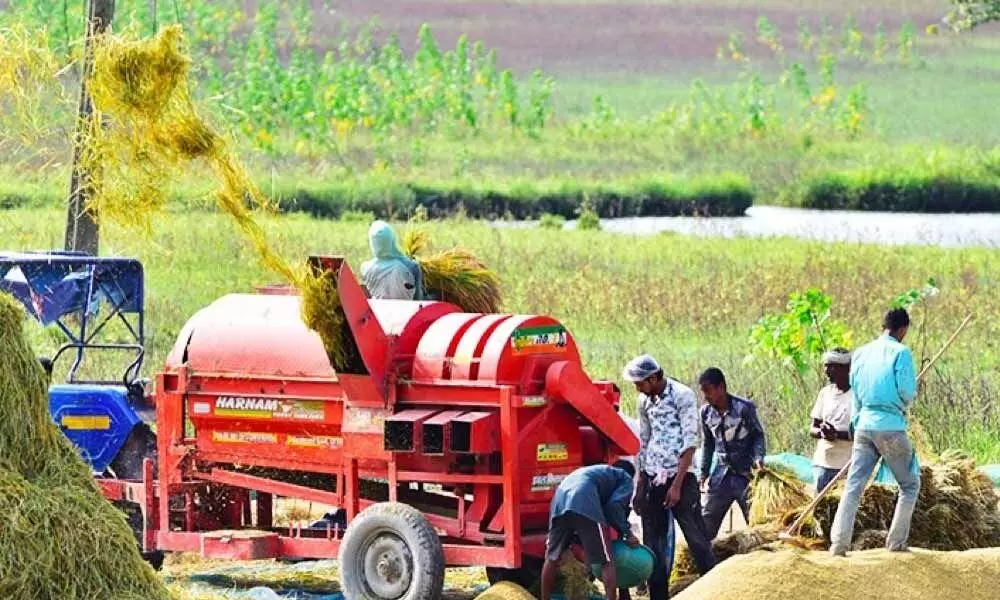Union Budget lacks inclusive developmental initiatives
The Budget should have focused on employment creation and policy support for boosting household consumption demand by raising the incomes of rural masses
image for illustrative purpose

Indian agriculture is supporting 58 per cent of the rural population who receives their livelihood from agriculture and allied activities as a primary source; hence, any public policy measure for improving agriculture is a welcome feature. Indian agriculture has grown at the rate of 4.3 per cent in 2019-20, registered 3.6 per cent in 2020-21, and followed by 3.9 per cent in 2021-22 while it remained robust in the pandemic gales and provided employment to many including migrant labour who returned home due to Covid-19. On the other hand, industry did not do well while services sector has posted a gross value added of 7.2, -8.4 and 8.2 per cent during the same period.
This year budget has an estimated expenditure of Rs 39.45 lakh crores while tax revenue, other than borrowings, estimated to be Rs 22.84 lakh crores. However, the deficit of Rs 16.61 lakh crores need to be filled up with market borrowings and other fiscal space creation measures. It needs to be seen that how the government is going to achieve the fiscal deficit of 6.4 per cent of GDP, against the huge budgetary gap, and finally 4.5 per cent by 2025-26.
When looked at the budget from rural perspective initiatives like modernization of two lakh AWCs, 18 lakh housing units under PM Awas Yojana, provision of drinking water facility to 3.8 crore houses with Rs 60,000 crore investment is laudable. A platform is going to be created for farmers for agricultural implements on rent are proposed while food processing industry is encouraged under the Union Budget. Further, 1000 lakh MT paddy will be procured by the Government to benefit the farmers. Besides, natural farming on a pilot basis from UP, PM Gati Shakti, land digitization, linking of rivers and three special schemes for women and children some of the initiatives that would benefit in the long run.
Given the great 'learning loss' due to closure of schools, absence of mid-day meals, focus on developing e-content for children in schools who were deprived of education during pandemic, 200 channels for PM online education, digital university, 75 digital banks, transforming post offices into banks and initiatives to make digital economy are relevant and welcoming features. In fact, the budget has given thrust to the MSMEs by creating a platform for marketing their output, a huge investment and credit guarantee scheme which hopefully generates employment for semi-skilled and skilled personnel in the near future.
In the wake of pandemic situation and slow recovery of the economy, rural economy should get a boost in terms of increased expenditure on agricultural infrastructure including irrigation, ramp up public spending on girl child education, strengthen primary health care system with a focus on maternity care and child health, apart from boosting MGNREGS etc. In order to address inflation which is 5.6 per cent and huge unemployment the country is facing, the Budget should have focused on employment creation and policy support for boosting household consumption demand by raising the incomes of rural masses. It is important to design and introduce new social protection programmes and strengthen the existing ones to protect and prevent the poor and vulnerable population falling into poverty.
The expected GDP growth rate of 8-8.5 per cent is meaningful and sustainable only when the rural economy responds positively by increasing the productivity, creating employment opportunities and raising the demand for industrial goods etc.
RBI report 'Coping with the Pandemic; The Third Dimension' has clearly stated that the fiscal strength of local self-governing institutions have to be improved as they have done an excellent job during Covid-19. But it did not get any mention in the budget which implements all the programmes at the grassroots level with people's participation and takes care of everyone without leaving no-one behind. Finally, if the Government has announced direct measures to improve the incomes of farming community, social protection to the farmers, poor and vulnerable sections it would have been a balancing act and resulted in inclusive development.
(The author worked with UN Women, UNICEF and UNDP previously)

